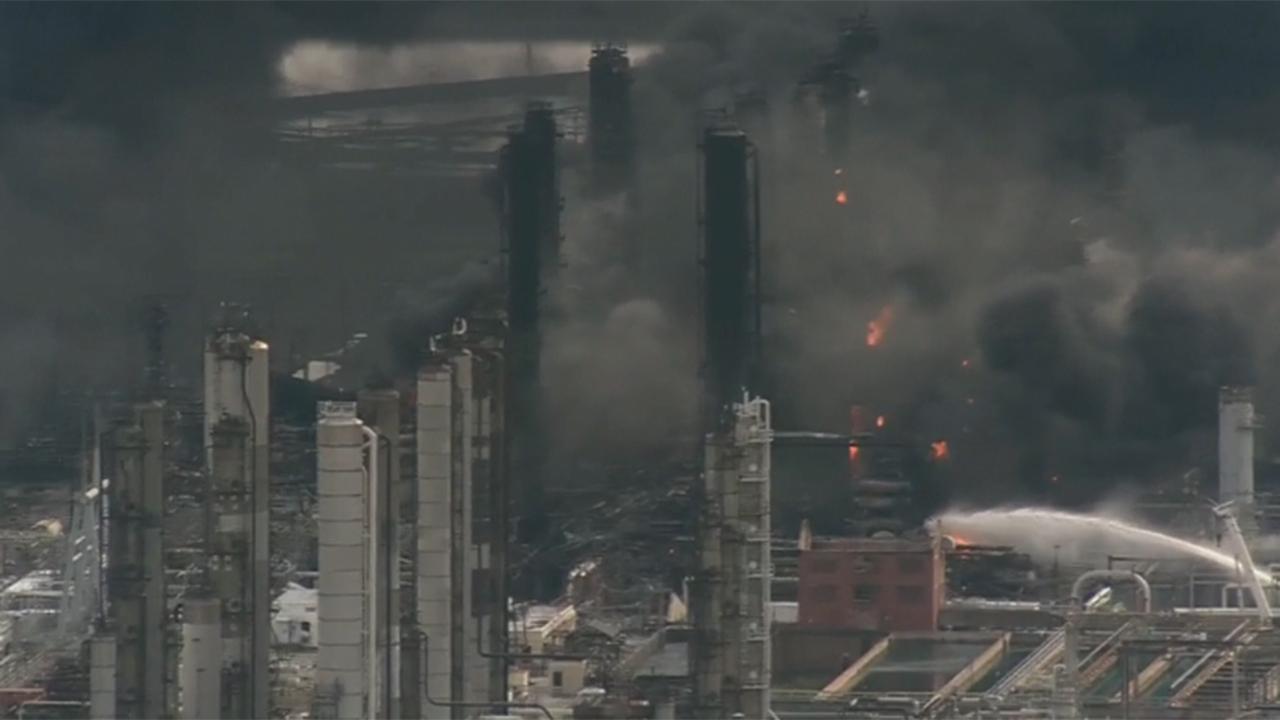Voluntary evacuation order lifted for Texas coastal city
PORT NECHES, Texas — Officials in the Texas coastal city of Port Neches lifted a voluntary evacuation order Thursday that was issued overnight because of concerns about air quality following a pair of chemical plant explosions last week.
Officials issued the voluntary order for the city of roughly 13,000 late Wednesday after elevated levels of the chemical butadiene were detected. Butadiene is a chemical used to make synthetic rubber and other products.
GET FOX BUSINESS ON THE GO BY CLICKING HERE
The elevated levels were caused by a leaking pressure relief valve on a storage tank, said Jefferson County Judge Jeff Branick. A 100-ton crane had to be brought in to help workers fix the valve on Thursday morning.
Jefferson County emergency management officials said the elevated levels did not pose a serious health risk but could cause dizziness, nausea, headaches or irritation to the eyes and throat.
The evacuation order was lifted hours later after the levels of butadiene dropped to a safe level, emergency management officials said.
“The levels that were detected near the facility and the community during the course of this event are far below what might contribute to long term health risks,” Branick, the county's top elected official, said during a news conference.
The first explosion happened early Nov. 27 at the TPC Group plant about 80 miles (130 kilometers) east of Houston and was so powerful it shattered windows and ripped doors off the hinges of nearby homes. A second blast occurred about 13 hours later, and the fire wasn't contained until Nov. 29.
TEXAS CHEMICAL PLANT FIRES FINALLY EXTINGUISHED AFTER A WEEK OF MASSIVE BLASTS
The blasts sent a huge plume of smoke into the air that was visible for miles.
At a news conference earlier Thursday, Manny Ehrlich, a board member with the U.S. Chemical Safety and Hazard Investigation Board, or CSB, said a “fundamental failure in the system ... resulted in this major incident.” But CSB officials said they did not have additional information on what might have caused this “failure” because their investigation had just begun.
Jason Sanders, the environmental manager for the TPC Group, said 88 of the 102 storage tanks at the facility have chemicals and other materials and that TPC plans to move these products to other facilities in the coming weeks.
The explosions were the latest in a series of high-profile accidents this year up and down the Texas Gulf Coast, which is home to the highest concentration of oil refineries in the nation. In July, an explosion at an ExxonMobil refinery in Baytown left more than dozen people with minor injuries and put nearby residents under a shelter-in-place advisory for three hours.
TEXAS CHEMICAL PLANT EXPLOSION: BY THE NUMBERS
“We’re committed to educating the industry as much as we can on what’s causing these incidents and how to prevent it," said Lauren Grim, a CSB supervisory investigator.
The recurring explosions have renewed calls by coastal residents and critics for tougher industry oversight. On Thursday, a report released by a Washington-based environmental watchdog concluded that since 2008, only Wisconsin has made deeper cuts to the budgets of state environmental regulators than Texas.
The Texas Commission on Environmental Quality has cut funding for pollution control programs by 35% over the past decade when adjusted for inflation, according to the Environmental Integrity Project. The nonprofit is led by Eric Schaeffer, who was the head of the U.S. Environmental Protection Agency's enforcement office during the Clinton and George W. Bush administrations.
CLICK HERE TO READ MORE ON FOX BUSINESS
The report also claimed that 34 of Texas' nearly 80 petroleum refineries have been “in continuous noncompliance" with pollution control laws over the last three years.
A TCEQ spokesman did not immediately return requests for comment about the report. Speaking after the Port Neches explosions, Toby Baker, the agency's executive director, criticized “an unacceptable trend of significant incidents” within the past year.




















